Theater Review by Carol Rocamora . . . .
A ferocious flock of Furies is unleashed in Lucy Kirkwood’s wild new play The Welkin. They seek vengeance upon the world—and each other—for the fate of being women.
A time-traveling thriller set in 1759 in rural Suffolk, England in the year that Halley’s comet was first sighted, this stick of dramatic dynamite (now playing at the Atlantic Theater Company’s Linda Gross Theater) tells the story of a jury of twelve angry women assembled to judge one of their neighbors. Twenty-one-year-old Sally Poppy has been accused of murdering and dismembering an eleven-year-old girl, daughter of the town’s wealthiest family. But Sally has “pleaded the belly” (translation: “is pregnant”) and according to local law, can be spared from hanging and be banished to America instead.
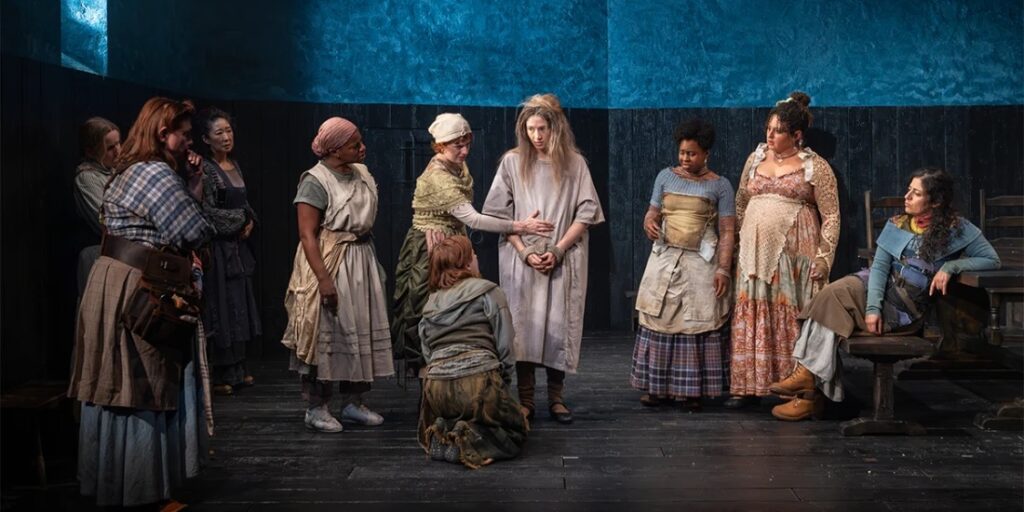
As played with fierce rebelliousness by Haley Wong, Sally appears in the first scene drenched in blood, confronted by her husband Frederick Poppy (Danny Wolohan) about her appearance and its implications, as well as her infidelity. She had galloped away months ago on horseback with her lover, Thomas McKay, who has already been hanged for the crime. In short, she’s a terror—as dislikeable a protagonist as you’ll ever encounter. Thankfully, she shares the spotlight with Lizzie Luke, the town’s midwife, played by the formidable Sandra Oh. Lizzie has been recruited to serve on the jury by Mr. Coombes (a convincing Glenn Fitzgerald), because of her expertise. If Lizzie can confirm Sally’s pregnant state and convince her fellow jurors, then Sally will be saved.
Lizzie is a credible expert—she began practicing her craft at age fourteen and has delivered the babies of all the women who serve on the jury. But her task is unexpectedly daunting, and she meets with opposition. Not all the women believe Sally—for a variety of reasons. After putting Sally through the humiliating test of being undressed and examining her breasts to ascertain if milk is being produced, the women insist that a male doctor (Danny Wolohan again) be summoned to pronounce the diagnosis.
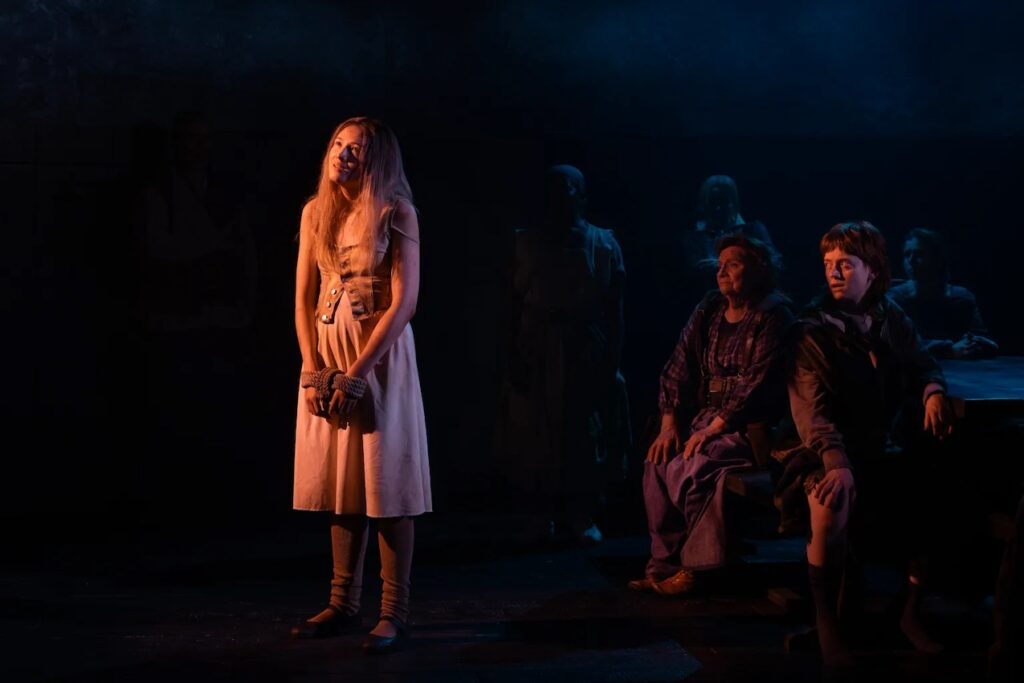
Not since Behind the Sheet (Charly Evon Simpson’s 2019 play) have we witnessed a gynecological examination on stage. Thankfully, it is masked by the women who surround it so that we don’t see the application of the monstrous instrument the doctor has brought along with him. The doctor confirms Lizzy’s diagnosis: that Sally is indeed pregnant (by her lover, we assume).
But playwright Lucy Kirkwood doesn’t leave well enough alone. Act II goes “off the walls,” as they say, offering enough plot twists, turns, and astonishing revelations to make your head spin, transforming a thriller into a melodrama that crescendos to a shocking conclusion (no spoiler alert).
Ultimately, The Welkin is a powerfully ambitious play about the plight of women in 1759—a proto-feminist outcry with a dark forecast for the future. “The life of a woman is a history of disease,” protests one of the twelve angry women. Kirkwood is unapologetically daring in the issues she raises about women and their bodies, with endless graphic detail, including miscarriages, menstruation, breast milk, rape, and sexual desire.
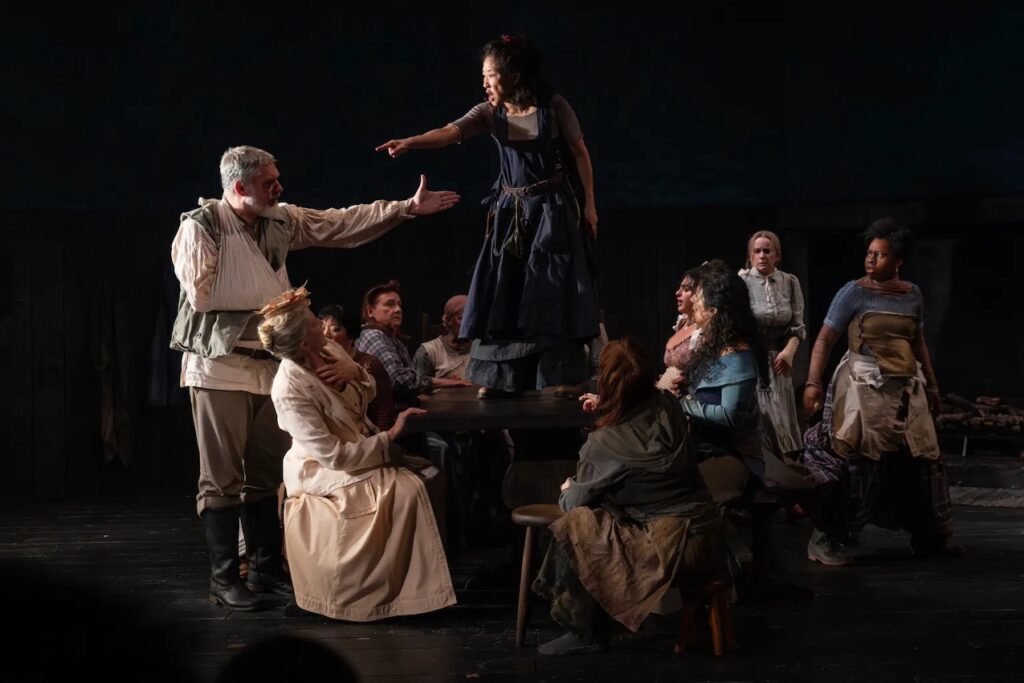
But the plight of their bodies is only one of their grim realities. When we first see the ensemble of the twelve women together—a stunning montage created by the fearless director Sarah Benson—they are at work, churning butter and performing all kinds of exhausting domestic tasks that are their duty; that is, when they’re not bearing children. Then, of course, there is the issue of women in the context of a male-dominated society. “Nobody blames God when a woman can be blamed instead,” pronounces one. Sadly, it’s a reality the women both rail against and support at the same time (note the choice of the male doctor).
Above all, there is the tragic element of competition and conflict among the women who are ultimately unable to support one another. Separated by age, class, and fertility (one woman has borne twenty-one babies, one survived the birth of a twelve-pound baby, and one is barren), childbearing is a traumatic event that separates rather than unites women.
To these themes, Kirkwood adds yet another dimension: that of the surreal. At one point a vision of a supernatural female spirit appears, floating above Sally, who has survived the brutal gynecological examination. At another, Lizzie is accused by another woman of being a She-Devil—an accusation Lizzie bitterly resents, shocked that the women who entrusted her with the birth of their children do not, ultimately, respect her skills.
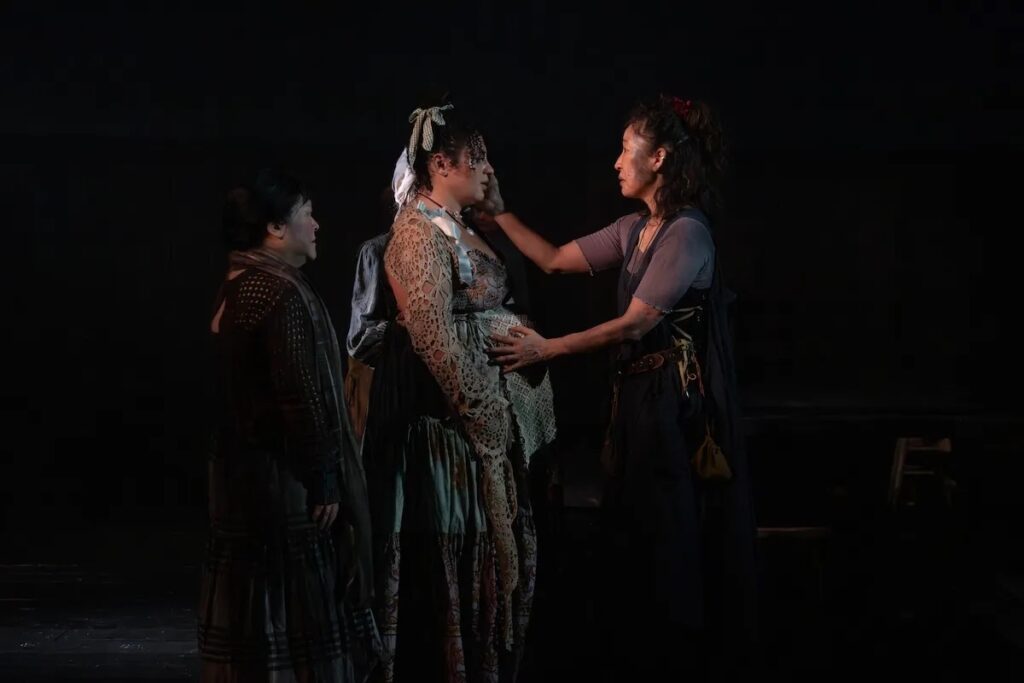
Finally, there is the overall context of the play, suggested by its title. Welkin is an ancient word for “the firmament,” where Halley’s comet will appear for the first time on the day that the play takes place. “Think of the women who will be in this room when that comet comes round again,” says Lizzie, articulating the context that Kirkwood intends.
There’s also an unexpectedly playful side to Kirkwood’s contextualization—a rather wicked one, in fact. At one point in Act Two the women jurists join in a chorus, singing (wait for it) “Manic Monday,” the 1980s song by the Bangles which describes the start of the work-week. Clearly, the playwright is saying that these profound issues that women faced then are ones that we face now—notably, the crisis of abortion-related issues and a woman’s right to control her own body, as well as equality in the workplace.
Can this ambitious, sensational play sustain all these themes, on top of a complex, serpentine plot? Watching The Welkin, I thought of Caryl Churchill’s Top Girls and Federico Garcia Lorca’s The House of Bernarda Alba (without Bernarda)—plays with robust female casts that address women and work. Also, Arthur Miller’s The Crucible, set in the same century as The Welkin, that addresses the paranoia of witchcraft.
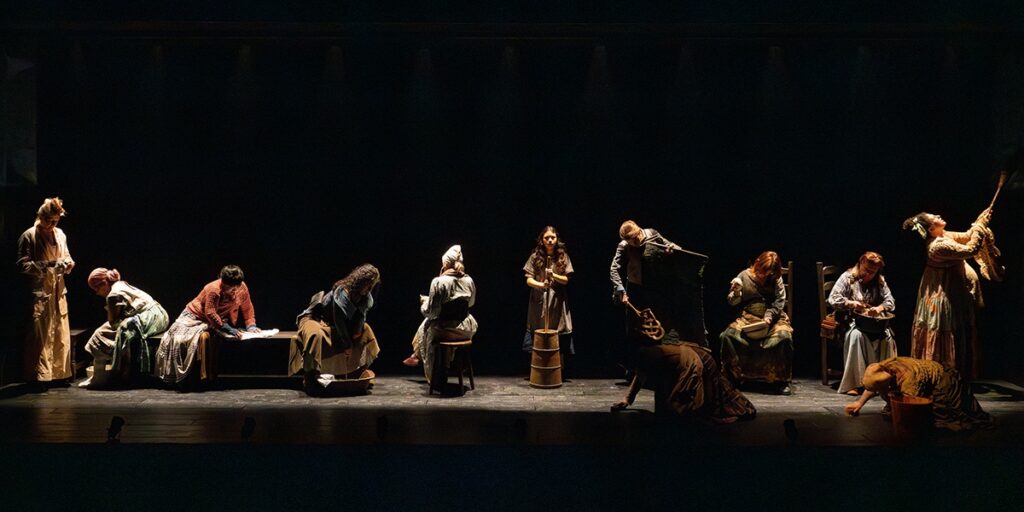
Ultimately, the thrill of The Welkin is its supreme theatricality. The tableau of those twelve actresses—plus Sally—locked in that jury room is an unforgettable one. Under Sarah Benson’s powerful direction, the cast members give, both individually and collectively, magnetic performances. In addition to Haley Wong as the ferocious Sally and Sandra Oh as the heroic, eloquent Lizzie, there are memorable moments: when, for example, Sarah Hollis (played by Hannah Cabell), a jurist who has not spoken since the birth of her son twenty-one years ago, pours out a stunning monologue about the Devil and childbirth. Emily Cass McDonnell’s depressed and childless Helen is heartbreaking. As Charlotte Cary, Mary McCann makes a masterful transition as an imperious society lady to reveal her true working-class identity.
Ultimately Lizzie is Lucy Kirkwood’s mouthpiece, delivering a plea for justice and dignity for women, then and now. A stand-out in her generation of playwrights for her ambition, her daring, and her tackling of serious issues (The Children, about environmental poisoning), she is a playwright of courage and conscience who deserves our attention.
The Welkin. Through July 7 at the Atlantic Theater Company’s Linda Gross Theater (336 West 20th Street, between Eighth and Ninth Avenues). www.atlantictheater.org
Photos: Ahron R. Foster

